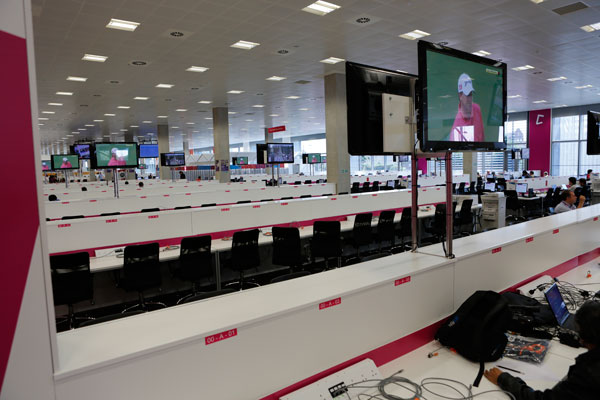Q. What is your role with IOC Press Commission?
A. I became involved with the IOC Press Commission shortly after I became a member of the Executive Board back in 1988. At that time, Juan Antonio Samaranch invited me to be Vice Chairman of the Press Commission. The Chairman of the Commission at that time was a Japanese gentleman called Masaji Kiyokawa. He retired two years later in 1990 and I took over the Commission, so I?ve been involved with it like that for 22 years now.
Q. What is the role of the IOC Press Commission?
A. It?s essentially a technical advisory committee and it?s there to advise the IOC, together with the Organising Committee, on what the needs are in technical terms, operational terms, logistical terms of the media, which number around 5,000 plus for each Summer Olympic Games. It?s one of the most satisfying Commission roles because a high component of the Commission is made up of professional people from outside the IOC ? experts and well-informed journalists, editors and photographers who have been involved with sports journalism for many years. The Commission also includes two or three IOC Members, representatives of the National Olympic Committees and the IFs, and normally a former media president of an Olympic Games, and the heads of media operations for forthcoming Games, so you?re getting the experience and transfer of knowledge from the previous Games media chiefs to the incoming media chiefs of the next Games.

Q. What does the Commission do to ensure the media has everything they need to cover the Games in the best way possible?
A. We meet as a Commission at least once a year and rising out of those meetings we will quite often appoint an ad hoc committee to investigate or advise on some special areas of activity. The Commission itself makes proposals, it reviews performance and it can establish committees to review specific areas. For example, when we were moving from straight newspaper reporting in the late 1990s and digital technology was on the horizon, we started to examine the impact of digital technology and online reporting and look at the extent to which it would impact our advisory groups. We were putting in forecasting groups to anticipate what impact online reporting would have on the written press, and how it would have an impact on their reporting procedures, photographic procedures, timing, costs and all of that. We always meet as a Commission usually two years before the next Games ? either Summer or Winter ? to observe practically what?s happening and be in a position to make recommendations onsite as to where improvements might be made, or where reviews may be made, or to reaffirm the decisions already made by the Organising Committee.
Q. What sort of work have you been doing with the London 2012 Organising Committee ahead of this year?s Games?
A. We?ve had an excellent working relationship with the London 2012 Organising Committee. The transfer of knowledge process within the IOC into the Organising Committee has moved to a very sophisticated level. I?m talking about written transfer of knowledge, reported transfer of knowledge and transfer of people themselves, who move from one Organising Committee to another. We?ve had a very good working relationship with LOCOG. Their Communications Director, Jackie Brock-Doyle, is a very well-informed person and has been extremely cooperative and the Head of Press Operations, Jayne Pearce, has a wealth of experience. The world press briefings, of which there are three in the lead-up to the Games, have been highly informative and enabled the media to move into the Main Press Centre in London with the minimum of fuss.
Q. Why is it so important to provide the media with everything they need to cover the Games?
A. The written media covers the Olympic Movement throughout the Olympiad ? not just during the Games ? so it?s important to keep them informed. Over eight million tickets will be sold for the London Games, which is quite a lot of people watching, but the written press, through its international agencies, such as Associated Press, Reuters, Xinhua, AFP, plus the top titles, help get stories out across the world to all 204 nations that send athletes to the Games. The written press, backed up by remarkable photography, sends the message out across the world. Without the written press, the Olympic Games would not be as well known or respected.

